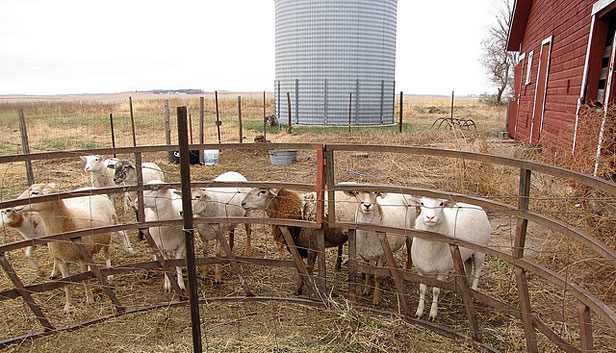The New York Times published a front-page exposé by Michael Moss on Nov. 6 about the federal government’s efforts to get us to eat more cheese, even working with Domino’s Pizza to make it happen. (Grist’s Tom Philpott lauded it here.)
 Could this be Dairy Management’s next campaign?The government’s semi-public commodity checkoff programs are a big deal, collecting more than $600 million each year to promote a variety of products [PDF]. These programs support many advertising campaigns you may know, for example: “Beef. It’s what’s for dinner,” “Pork. The other white meat,” “Ahh, the power of cheese,” and “Got milk?” The biggest funding shares are for dairy, beef, and pork. There is no checkoff funding for poultry, and very little for fruits and vegetables.
Could this be Dairy Management’s next campaign?The government’s semi-public commodity checkoff programs are a big deal, collecting more than $600 million each year to promote a variety of products [PDF]. These programs support many advertising campaigns you may know, for example: “Beef. It’s what’s for dinner,” “Pork. The other white meat,” “Ahh, the power of cheese,” and “Got milk?” The biggest funding shares are for dairy, beef, and pork. There is no checkoff funding for poultry, and very little for fruits and vegetables.
Of course, there has been a backlash to the Times story. In their counterattacks, several recent commentators have come close to denying that these checkoff programs are federal government programs. James McWilliams writes in the Atlantic: “Funding for Dairy Management’s domestic marketing campaign does not come from the USDA, but rather from private producers who tax themselves to pay for the organization’s marketing strategies.” The Daily Yonder wrote that the checkoff programs are industry initiatives and that the Times‘ headline should have been “Industry Group Uses its Own Funds To Promote Its Products.”
These claims by McWilliams, the Daily Yonder, and Grist commenters understate the federal government’s role. Here’s why:
- The federal government established each of the checkoff programs
- The secretary of agriculture appoints the board members from a slate of candidates proposed by the industry
- USDA’s Agricultural Marketing Service must approve every promotion campaign in writing
- The federal government uses its power of taxation to enforce the collection of the funds that sponsor these campaigns. If a producer fails to pay, the U.S. Department of Justice takes them to court. For the cheese and dairy programs in particular, USDA proudly boasts of its central role at great length in its annual reports to Congress.
If these were independent industry entities, then producers would be able to opt out, right? The Daily Yonder claims that producers “tax themselves.” Think about heritage pork producers who are proud of their fat Berkshires and get no benefit from a checkoff advertising slogan that compares pork to chicken. Can they decide freely whether to make a voluntary contribution? No, the assessment is mandatory. Are they being taxed by “the industry”? No, the industry has no such power of taxation. The producers are being taxed by the federal government.
When dissident producers challenged the legality of the checkoff programs, the Supreme Court ruled in 2005 in favor of the checkoff programs, only because the federal government attorney convinced the justices that these programs are from top to bottom federal government programs, and their every message has official status as “government speech.” In his legal analysis of that case, John Crespi explained that the checkoff programs had to pass the following standards to be ruled constitutional [PDF]: “First, the government must exercise sufficient control over the source of the message to be deemed ultimately responsible for the message. Second, the main purpose of the message and the program must be identified as the government’s.”
If the checkoff programs were not government programs, the government would not be allowed to support them using the power of taxation, and the Supreme Court would have ended them.
For this reason, nobody at USDA or the checkoff programs will ever directly deny that they are government programs. Instead, McWilliams and the Daily Yonder have to hint that they think of these programs as private-sector operations, without quoting anybody at USDA or the programs themselves to corroborate this point.
In the backlash against the Times article, misdirection rather than clear statements is the order of the day. For example, the Daily Yonder denies that the programs are using “your tax money.” This is like telling you that the government is not using “your tax money” for the war in Iraq or welfare checks or whatever you object to. The government might be collecting the tax that funds those activities, but it can reassure you that your particular tax payment was not the actual dollars used.
Who cares which tax dollars were used for which purpose? If the federal government collected the tax, and the purpose is bad, we have a right to object.
I say, Congress should either: (a) stop having the federal government enforce the checkoff assessments, or (b) expect that the checkoff messages serve our stated public-health goals at a time when healthcare costs are threatening to bankrupt the government.
The meat and dairy industries can do what they like with their own money. The public power of taxation should be used for the public good. Michael Moss’s article exposed the government’s hypocrisy in trying to serve industry marketing goals and the public good at the same time.



